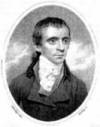Robert Bloomfield Biography
Robert Bloomfield (December 3, 1766 – August 19, 1823) was an English poet.
He was born of a poor family in the village of Honington, Suffolk. He lost his father when he was a year old, and received the rudiments of education from his mother, who kept the village school. Apprenticed at the age of eleven to a farmer, he was too small and frail for field labour, and four years later he came to London to work for a shoemaker under an elder brother, enduring extreme poverty. The poem that made his reputation, The Farmer's Boy, was composed in a garret in Bell Alley where half a dozen other men were at work. He carried finished lines in his head until there was time to write them down. The manuscript, declined by several publishers, fell into the hands of Capel Lofft, a Suffolk squire of literary tastes, who arranged for its publication with woodcuts by Thomas Bewick in 1800. The success of the poem was remarkable, over 25,000 copies being sold in the next two years. It was reprinted in Leipzig, with a French translation, Le Valet du Fermier, published in Paris, an Italian translation in Milan, and a Latin translation, Agricolae Puer, by the Rev. W. Clubbe.
Bloomfield's reputation was increased by the appearance of his Rural Tales (1802), News from the Farm (1804), Wild Flowers (1806) and The Banks of the Wye (1811). Influential friends attempted to provide for Bloomfield, but ill-health and possibly faults of temperament prevented the success of these efforts. One writer attributed his poverty to "imprudent liberality to poor relations". An attempt to carry on business as a bookseller failed, his health gave way, his reason was threatened, and he died in great poverty at Shefford, Bedfordshire, in 1823 (where he now has a Middle school named in his honour). His Remains in Poetry and Verse appeared in 1824.
His brother, Nathaniel, was the author of a collection entitled An Essay on War, in Blank verse; Honington Green, a Ballad; The Culprit, an Elegy; and Other Poems, on Various Subjects (1803).
My untried muse shall no high tone assume,
Nor strut in arms - farewell, my cap and plume!
Brief be my verse, a task within my power;
...
I rise, dear Mary, from the soundest rest,
A wandering, way-worn, musing, singing guest.
I claim the privilege of hill and plain;
Mine are the woods, and all that they contain;
...
Where's the Blind Child, so admirably fair,
With guileless dimples, and with flaxen hair
That waves in ev'ry breeze? he's often seen
...
I had folded my flock, and my heart was o'erflowing,
I loiter'd beside the small lake on the heath;
...
Poor Ellen married Andrew Hall,
Who dwells beside the moor,
Where yonder rose-tree shades the wall,
And woodbines grace the door.
...
